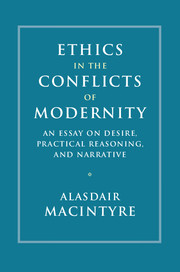Book contents
2 - Theory, practice, and their social contexts
Published online by Cambridge University Press: 01 December 2016
Summary
How to respond to the type of philosophical disagreement described in Chapter 1: the social contexts of philosophical theorizing
The impasse at which we had arrived is a philosophical impasse, one in which two incompatible sets of theses and arguments confront one another and the protagonists of each are unable to identify standards shared with their opponents by appeal to which their disagreements might be resolved. It is an impasse with a double aspect, involving two sets of rival claims, one in which an expressivist account of ‘good’ and good is counterposed to a NeoAristotelian account and one in which something very close to Frankfurt's account of the relation of our practical reasoning to what we care about is counterposed to a NeoAristotelian account of desire and practical reasoning. In the face of it, how should we proceed? Are we simply to leave matters so that the protagonists of each party remain as satisfied with their own position as they are dismissive of that of their rivals? Is this particular philosophical enquiry, like a number of others in contemporary philosophy, either to become interminable or to terminate in unresolvable conflict?
Perhaps what we now need to think about is the nature and limitations of philosophical enquiry or rather of philosophical enquiry as nowadays characteristically conceived, since that is the type of enquiry through which I arrived at my conclusions. Does the impasse at which I arrived perhaps result from the nature and limitations of such enquiry, enquiry that is narrowly academic? As such it operates under three sets of constraints. First, it is carried on in college and university classrooms and seminars, and in journal articles and books written almost exclusively for those who teach and learn in those classrooms and seminars. So it has its own distinctive idiom, one very different from that of most plain persons, most moral agents. The question therefore arises as to whether it may be apt in some degree to misrepresent the commitments of plain persons. Secondly, it has an assigned and well-defined academic territory. Philosophy is one thing, physics another, sociology a third, history a fourth, but it is no one's province to identify the limitations of each of these types of enquiry so that questions which cannot be answered from within one discipline are always in danger of going unasked.
- Type
- Chapter
- Information
- Ethics in the Conflicts of ModernityAn Essay on Desire, Practical Reasoning, and Narrative, pp. 70 - 113Publisher: Cambridge University PressPrint publication year: 2016

